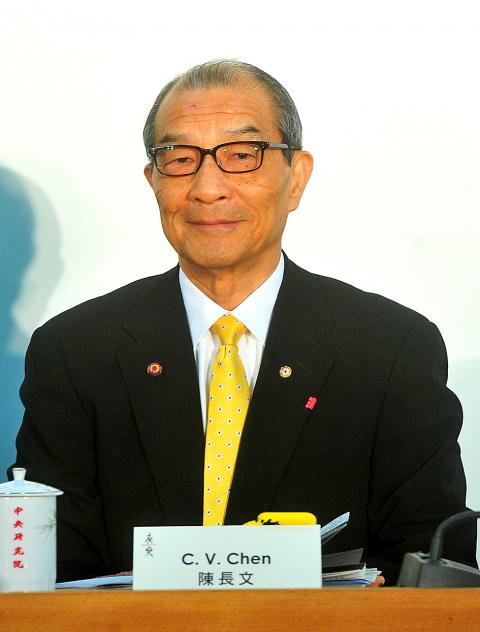The issue of how to handle Hong Kong murder suspect Chan Tong-kai (陳同佳) is akin to a “demon-revealing mirror” that can reveal not only the demon, but also the “demon within the demon,” Premier Su Tseng-chang (蘇貞昌) said yesterday.
Su made the remark on the sidelines of a meeting at the Legislative Yuan in Taipei following a statement earlier yesterday by the Reverend Peter Koon (管浩鳴), a member of the Chinese People’s Political Consultative Conference and Anglican clergyman, saying that Chan would surrender to Taiwanese authorities after January’s presidential and legislative elections.
Chan has reportedly confessed to Hong Kong police that he killed his pregnant girlfriend, Poon Hiu-wing (潘曉穎), in February last year while visiting Taiwan, before returning to Hong Kong.

Photo: Chien Jung-fong, Taipei Times
The Hong Kong government on Monday notified Taiwan that Chan would like to “turn himself in” to Taiwanese authorities after leaving prison. He was on Wednesday released from a Hong Kong prison after serving a suspended sentence for theft and money laundering charges.
It appears that “a close friend of former president Ma Ying-jeou (馬英九)” planned to “let the Hong Kong government off the hook” regarding a controversy over a now-withdrawn extradition bill — the catalyst for months-long protests in the territory — by representing Chan, Su said.
The premier was referring to lawyer C.V. Chen (陳長文), who was the first secretary-general of the Straits Exchange Foundation when it was founded in 1991.
Su said that Chen representing Chan and Ma’s “fake crying” on Tuesday apparently to show sympathy for the victim’s family are linked to “a clergyman who doubles as a Chinese People’s Political Consultative Conference member” who has acted as an intermediary between Chen and the Hong Kong government.
He likened the situation to a “demon-revealing mirror that has revealed the demon and the demon within the demon.”
If the government is not vigilant, it could remain in the dark after Taiwan has fallen into a trap, Su said.
During a question-and-answer session with Chinese Nationalist Party (KMT) Legislator Lu Yu-ling (呂玉玲), Su denied that the Mainland Affairs Council and the National Immigration Agency had interfered with the Shilin District Prosecutors’ Office’s investigation into the case by denying Chen entry into the nation.
The government has repeatedly urged Hong Kong to press murder charges against Chan due to its proximity and access, but it has instead allowed the suspect of a felony to travel freely, he said.
After Su said that Chan would no longer be coming to Taiwan, Lu said that he would, as he has been communicating with Koon.
The situation is “out of control,” Su said.
Lu then appeared stumped when Su asked her when Chan would apply to visit Taiwan.
The government should “do what it should” regarding Chan’s case, Lu said, to which Su replied that it has been doing exactly that.
Separately yesterday, Ma said Su’s analogy showed that he is unfit to be premier, adding that its absurdity was dumbfounding.
From President Tsai Ing-wen (蔡英文) to her ministers, the Democratic Progressive Party (DPP) has made a string of blunders, as none of them seem to know that Hong Kong does not have jurisdiction over a criminal case that occurred outside its borders, Ma said.
The DPP got itself into a sticky situation and has resorted to scapegoating, he added.
Additional reporting by Wu Cheng-ting

Authorities have detained three former Taiwan Semiconductor Manufacturing Co (TMSC, 台積電) employees on suspicion of compromising classified technology used in making 2-nanometer chips, the Taiwan High Prosecutors’ Office said yesterday. Prosecutors are holding a former TSMC engineer surnamed Chen (陳) and two recently sacked TSMC engineers, including one person surnamed Wu (吳) in detention with restricted communication, following an investigation launched on July 25, a statement said. The announcement came a day after Nikkei Asia reported on the technology theft in an exclusive story, saying TSMC had fired two workers for contravening data rules on advanced chipmaking technology. Two-nanometer wafers are the most

NEW GEAR: On top of the new Tien Kung IV air defense missiles, the military is expected to place orders for a new combat vehicle next year for delivery in 2028 Mass production of Tien Kung IV (Sky Bow IV) missiles is expected to start next year, with plans to order 122 pods, the Ministry of National Defense’s (MND) latest list of regulated military material showed. The document said that the armed forces would obtain 46 pods of the air defense missiles next year and 76 pods the year after that. The Tien Kung IV is designed to intercept cruise missiles and ballistic missiles to an altitude of 70km, compared with the 60km maximum altitude achieved by the Missile Segment Enhancement variant of PAC-3 systems. A defense source said yesterday that the number of

A bipartisan group of US representatives have introduced a draft US-Taiwan Defense Innovation Partnership bill, aimed at accelerating defense technology collaboration between Taiwan and the US in response to ongoing aggression by the Chinese Communist Party (CCP). The bill was introduced by US representatives Zach Nunn and Jill Tokuda, with US House Select Committee on the Chinese Communist Party Chairman John Moolenaar and US Representative Ashley Hinson joining as original cosponsors, a news release issued by Tokuda’s office on Thursday said. The draft bill “directs the US Department of Defense to work directly with Taiwan’s Ministry of National Defense through their respective

Tsunami waves were possible in three areas of Kamchatka in Russia’s Far East, the Russian Ministry for Emergency Services said yesterday after a magnitude 7.0 earthquake hit the nearby Kuril Islands. “The expected wave heights are low, but you must still move away from the shore,” the ministry said on the Telegram messaging app, after the latest seismic activity in the area. However, the Pacific Tsunami Warning System in Hawaii said there was no tsunami warning after the quake. The Russian tsunami alert was later canceled. Overnight, the Krasheninnikov volcano in Kamchatka erupted for the first time in 600 years, Russia’s RIA